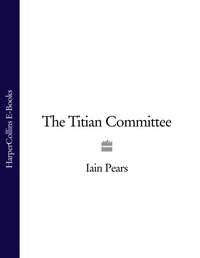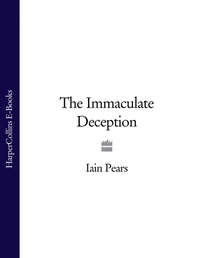
Полная версия
The Bernini Bust
He was about to make careful enquiries about the guest list when he was interrupted by a semi-sniffle of alarm from Thanet, who whipped out his handkerchief once more and gave a convincing impression of trying to hide behind it.
The focus of his anxiety was a small, brown-haired woman whose immaculately constructed elegance was marred only by a face of steadfast and determined hardness. Early middle-age, but fighting back with the best technology money could buy. She had driven up to the museum in a vast car and was now heading their way.
‘Damnation,’ said Thanet, turning to confront the menace.
‘Samuel Thanet. I want a word with you,’ she called as she marched across the lawn, giving the luckless gardener a nasty look as he started to protest once more.
Her eyes swept across the assembled company with all the warmth of a high-pressure water-hose. ‘What piece of chicanery have you pulled off this time?’
‘Oh, Mrs Moresby…’ Thanet said desperately, giving the others the only introduction they ever received.
‘Oh, Mrs Moresby,’ she mimicked in an unappealing fashion. ‘Stop whingeing. What I want to know is,’ she paused for dramatic effect and pointed an accusing finger at him, ‘what in God’s name are you up to now?’
Thanet stared at her in bewilderment. ‘What?’ he said in surprise. ‘I don’t know what…’
‘You know very well what. You’ve been bamboozling my husband again.’
Di Souza, always adverse to being left out of conversations with handsome and vastly wealthy women, spotted his opportunity. ‘What does bamboozling mean?’ he asked, smiling in the way which, he firmly believed, normally made hearts flutter.
Mrs Moresby added him to her list of people who deserved looks of withering contempt. ‘Bam-boozling,’ she said slowly but rather nastily. ‘From bamboozle. Verb. To defraud. To corrupt. To pull the wool over the eyes of sweet, trusting old men. To buy, in other words, stolen or otherwise illegally acquired works of art for the purposes of egotistical self-aggrandisement. That’s what bamboozling means. And this stumpy little creep,’ she said, pointing at Thanet in case there was any doubt, ‘is the arch bamboozler. Got it?’
Di Souza nodded slowly, having failed to understand what on earth she was talking about. ‘Yes, perfectly, thank you,’ he said in what he always considered to be his most charming fashion. Highly reliable usually, and the prop on which he had built an old but deserved reputation for irresistibility. It singularly failed to work its magic on Anne Moresby.
‘Good,’ said Mrs Moresby. ‘Now keep your nose out of this.’
Di Souza drew himself up in dignified protest. ‘Madam, please…’
‘Ah, shut up.’ She cut him dead and directed her full attention at Thanet. ‘Your grasping ambition for this museum is out of hand. I’m warning you, if you keep on manipulating my husband, when he comes this evening you are going to pay a very heavy price indeed. So you watch yourself.’ She poked him in the chest for emphasis.
She did an abrupt about-turn and marched back across the lawn. Didn’t even say goodbye. In the background the gardener threw up his hands in despair and, as soon as the car swept back out into the street, came across to examine the damage.
Thanet watched her go impassively. He almost looked pleased.
‘What on earth was that all about?’ Argyll asked in astonishment.
Thanet shook his head and declined the invitation to hand out confidences. ‘Oh, it’s a long story. Mrs Moresby likes to take on the role of the dutiful wife protecting her husband from the outside world. And looking after her own interests into the bargain. I’m very much afraid she likes to practise on me. It may well indicate that Mr Moresby will indeed be making an important announcement tonight.’
Clearly, much remained unsaid here, but Argyll had no opportunity to pursue the matter. Thanet fended off further questions, apologised profusely for the unorthodox way in which di Souza had been welcomed, and sniffled his way off to the solitary splendour of his office in the administrative block. The two Europeans watched him go in silence.
‘Can’t say I’d like his job,’ Argyll ventured after a pause.
‘I don’t know,’ di Souza said. ‘Whatever Moresby’s faults, I have heard that he pays well. Are you going to go this evening?’
Argyll nodded. ‘Seems so.’
Di Souza waved his hand dismissively. ‘Good. The place will probably be littered with artistically starved wealth. All wanting genuine works of art imported direct from Europe. Could make your career, if you oil your way around the clientele properly. And mine, come to think of it. If I can only unload my stock on some of them I’ll be able to retire a happy man. I just hope that dreadful woman won’t be there.’
‘The trouble is, I’ve never been very good at parties…’
Di Souza tut-tutted. ‘You’re the only art dealer I know who feels embarrassed about selling things to people. You must get over this disgusting reticence, you know. I know it’s the mark of an English gentleman but it’s bad news here. The hard sell, my boy. That’s what’s needed. Get the bit between your teeth, the wind in your sails, the eye on the ball…’
‘And trip up?’
‘And make money.’
Argyll looked shocked. ‘I’m most surprised to hear you talking in such blatantly materialistic terms. And you an aesthete, too.’
‘Even aesthetes must eat. In fact, we spend a fortune on food, because we’re so fussy. That’s why we’re such expensive friends. Come now, this is your big chance.’
‘But I’ve just sold a Titian…’ Argyll protested, feeling his professional acumen was being called into question a little.
Di Souza looked unconvinced. ‘Many a slip,’ he said supportively, and Argyll glared at him. The last thing he needed at the moment was something else to worry about. ‘After all, you’ve not cashed the cheque yet.’
‘I haven’t even got the cheque yet.’
‘There you are. It’s amazing the things that can go wrong. Take Moresby, now. I remember, just after the war…’
Argyll did not want to hear. ‘That Titian is as sold as you can get,’ he said firmly. ‘Don’t go around putting ideas into people’s heads.’
‘Oh, very well,’ di Souza replied, annoyed to be interrupted in mid-anecdote. ‘If you restrain yourself over my sculpture. All I was trying to say is that the good dealer never misses an opportunity. Think how much your stock will rise with Byrnes if you unload something else while you’re here.’
‘My stock is quite high already, thank you,’ Argyll said primly. ‘I’ve been asked to go back to London. Perhaps become a partner.’
Di Souza was impressed, as well he might be. Argyll, after all, left out the bit that it was more of an order than a request, and the result of a cutback rather than a promotion.
‘You’re leaving Rome? I thought you were settled permanently.’
That, of course, was the rub. Argyll had also thought he was settled permanently. But it seemed that, in reality, he had no real ties to the place at all. Not when it came to the test.
He shrugged miserably. Like Thanet, he was not in a confiding mood at the moment. Di Souza, ever insensitive, assumed he was thinking about money.
2
For all Argyll’s misgivings, the party was an impressive affair, especially for a scratch effort. However nasty an employer Moresby might be, clearly parties were an area where blank cheques ruled. And whatever the inadequacies of the museum itself at least its entrance lobby was a good place for a bash. Centre stage was a vast table covered in ice and half an ocean full of miscellaneous shellfish; nibbles there were aplenty; a jazz band blasted away in one corner, a string quintet in another, to emphasise the museum’s mission to unify high and popular culture. No one paid much attention to either. The drink situation, while not generous, was adequate if you worked at it.
In short supply, however, were all those multi-millionaires slavering at the chops to buy up Argyll’s small (but select) stock of goods. Perhaps they were there and he just didn’t know how to spot them. You couldn’t, after all, just sidle up to someone and ask for a quick peek at their bank statement, though some people did seem to have a sixth sense for this sort of thing: Edward Byrnes instinctively headed towards people with excess cash burning a hole in their pockets. Argyll had never worked out how he did it. Nor had he ever grasped how to manipulate a conversation so that it imperceptibly came round to the question of, say, nineteenth-century French landscapes. Of which, by chance, you happened to have a fine example…
On his own little ventures into this complicated territory he generally found himself trying to sell Flemish genre pieces to waiters. When he did manage to latch on to the right person, he ended up demonstrating at length how his pictures weren’t really that good, and recommending something currently owned by a rival.
So it was this evening. Almost subliminally, he managed to convey the notion that he found the idea of selling something faintly distasteful. While he had the distinct impression that Hector di Souza was unloading his fakes on every wealthy woman in the area, Argyll scarcely even managed to tell anyone he had anything to sell. His one substantial conversation was with the architect, a flamboyantly casual man with a pronounced tendency to middle-age spread, who lectured him on the synthesis of modernist utilitarianism and the classicist aesthetic as expressed in his own oeuvre. To put it another way, he talked about himself non-stop for twenty minutes. The fact that he was one of those people who constantly look over your right shoulder for someone more interesting didn’t make him any more endearing.
But the conversation was not entirely without interest: in a fit of self-satisfaction, the architect confided that this was a big evening for him. Old man Moresby had finally committed himself to the Big Museum (known to all staff as the BM), and was going to announce it tonight. Hence the panic, hence the sudden visit, hence Thanet’s vague air of smugness to counter the more general worry, and hence, presumably, Anne Moresby’s pre-emptive strike a few hours earlier.
‘The biggest private museum commission for decades,’ he said with excusable satisfaction. ‘It’s going to cost a bomb.’
‘How much is a bomb?’ asked Argyll, who loved hearing of other people’s folly.
‘The fabric alone will be about 300 million.’
‘Dollars?’ Argyll squeaked, appalled at the very thought.
‘Of course. What do you think? Lire?’
‘Dear God. He must be crazy.’
The architect looked upset that anyone might query the idea of entrusting him with so much money. ‘Museums are the temples of the modern age,’ he intoned sonorously. ‘They enshrine all that’s beautiful and worth preserving in our culture.’
Argyll gazed at him quizzically, trying to discern whether he was joking. He came to the depressing conclusion that the man was serious. ‘Bit pricey, though,’ he objected.
‘You have to pay for the best,’ the architect insisted.
‘And that’s you?’
‘Of course. I am by far the most significant architect of my generation. Perhaps of any generation,’ he added modestly.
‘But doesn’t he have anything better to spend it on?’
Evidently for the first time, the architect considered the possibility for a moment. ‘No,’ he said firmly after a while. ‘If he abandoned the museum, everything would go to his godawful son. Or his godawful wife. If they weren’t so dreadful, I doubt this project would ever have got off the ground.’
Then he saw a more important person on the other side of the room and whisked himself off. Argyll, offended at being abandoned but relieved he was left alone, shot like a bullet in the direction of the drinks section to recover himself.
Business was not brisk; the waiter had a slight air of under-employment. One person, however – and Argyll warmed to him the moment he saw him pointing a shaky finger at the whisky – seemed to be doing his best to make the poor soul feel wanted.
‘Great,’ said this stranger, a man in his late thirties with long fair hair of an antique cut. ‘Thought I was the only person here drinking something other than Perrier. What you having?’
This wasn’t so generous, considering all the drinks were free, but as an invitation to conversation it was adequate. Argyll refilled and they leant back on the table, companionably side-by-side, and watched the world go by.
‘Who’re you?’ the man asked. Argyll explained. ‘Thought I’d not seen you around before,’ he said. ‘You here to unload fakes and curios on my old man?’
Argyll was both affronted and intrigued in equal measure. This, it seemed, was Arthur M. Moresby III, known as Jack, although he did not know why. So he asked. Jack Moresby looked pained.
‘To distinguish me from my father. My middle name, I hate to say, is Melisser.’
‘Melissa?’
‘Melisser. My mother’s maiden name. Father reckoned that being his son gave me too many advantages, so he thought he’d give me something to struggle against. You know, he sort of thought that being beaten up at school for having a cissy name would give me an edge.’
‘Goodness.’
‘Yeah. I can’t be called Arthur, as I refuse to be mistaken for him, and being someone who drinks a pint of whisky a day, I naturally can’t accept being called Melisser. Jack seems more writerish, I reckon.’
‘You write books?’
‘Just said so, didn’t I?’
A direct manner, just this side of being rude. Argyll began to understand why he was not held in high esteem by architects and people like that. To change the subject he assured him that he did not sell fakes. He was here to deliver a small but exquisite piece of unquestioned value.
Jack was not convinced, but seemed content to let it pass. Argyll asked if he spent much time at the museum. He nearly choked on his whisky and said he would ordinarily not be seen dead in the place.
‘Look at this bunch,’ he exclaimed, sweeping his arm across to include the entire room. ‘Have you ever seen such a collection of creeps gathered into a room before? Eh? What you think?’
Legally, this is known as a leading question and was one which required a careful answer. Besides, as Argyll could assure him, in his line of business a whole room full of creeps was nothing unusual. Who else was he meant to sell his pictures to?
Jack conceded the point, and refilled. Argyll proffered a bowl of peanuts by way of return. Jack shook his head. Never touched them. The salt made his ankles swell up. Argyll regarded the peanuts with new respect. Which creeps did he have in mind, in particular? he asked, pointing out that, being new to the country, he was not so good at spotting them yet.
So junior gave a quick guided tour. He was surprisingly knowledgeable, considering that he said he avoided his family and its associates as much as possible.
Samuel Thanet, he said, pointing ostentatiously to the director, who had been cruising around the room being hospitable ever since they got there. He had a very definite party technique: regulation one minute of conversation then on to the next person. Some people do this well, but not Thanet; he managed to make everything seem an unwelcome chore. Not surprising, really, Jack commented. Thanet didn’t really care about people; he was wedded to the idea of going down as founder of the greatest private museum in North America. Using other people’s money, of course. Mousy, quiet, nervous, but utterly poisonous. A man who would never do a mean trick – as long as he could get someone else to do it for him.
‘Look at him there,’ he said. ‘All tweedily a-twitter, waiting for my father to turn up so he can give his boots a good lick.’
The characterisation seemed a little unfair. Argyll was prepared to agree about the mousy and nervous side, but so far at least had seen nothing resembling venom. On the other hand, he was prepared to admit he did not know the man very well. In any case, his technique clearly worked, whatever it was, if Moresby was on the verge of shelling out over $300 million on a new museum.
Jack didn’t seem very impressed. ‘You don’t know my father,’ he said. ‘I’ll believe in this new museum when I’m invited to the opening ceremony.’
He got tired of contemplating the director and moved on. ‘James Langton,’ he said, pointing at the white-linen-clad man in his late fifties who had been so gratifyingly keen on Titian. ‘English slimebag.’
Argyll raised an eyebrow.
‘Sorry. But you know what I mean. Supercilious, disdainful, mocking, dishonest. Wouldn’t you say those are national characteristics?’
‘Not really,’ Argyll said, a host of English people fitting that description swarming into his mind.
‘Well, I do. Used to be chief leech, until Thanet came along. Since then he’s become an international parasite. Paris, Rome, London, New York, as they say on the perfume bottles. Devoted himself to searching out every overpriced fake in the world for my father’s collection, buying it and taking a hefty cut for his services.’
Argyll felt aggrieved, and mentioned his Titian once more. He was beginning to develop a complex about it.
‘So we all make mistakes,’ Jack said with no discernible interest. ‘Even a man of Langton’s huge talent couldn’t get a hundred per cent success rate. He must slip occasionally and buy something genuine.’
On he went. ‘Mummy dearest,’ he said, pointing at the petite, expertly dressed woman Argyll had encountered earlier that afternoon. She had arrived twenty minutes earlier. ‘She’s my stepmother, but she doesn’t like to be called that. On the make. Quite assiduous about it. She has a vague southern accent but in fact comes from Nebraska. Do you know where Nebraska is?’
Argyll confessed he didn’t. Jack nodded as though this proved it.
‘Nor does anybody else. She hit the jackpot with my old man, and will stick with him until he croaks and she can get her hands on his money. Unless the museum gets it first.’ He regarded the woman with apparent indulgence, then dismissed her abruptly from his mind and switched to another target.
‘David Barclay,’ he said firmly, pointing to an excessively groomed personage talking to Anne Moresby. ‘His signature will be on your cheque – if you ever get it. My father’s lawyer and personal factotum, on permanent secondment from some law firm. The éminence grise of the family. Handsome little bastard, don’t you think? The sort that works out before going to the office. So many designer labels on him he resembles the advertising section of Vogue. Drop him in a sewage plant and shit would become fashionable. My father,’ he went on in a loud stage-whisper, breathing a whisky fragrance into Argyll’s face from close range, ‘is a bit of a sucker for up-and-coming professional types. That’s why I’m such a disappointment to him. He can’t resist someone like Barclay. Nor can my beloved stepmother.’
‘I beg your pardon?’ Argyll said, caught a little by surprise.
‘Little David is connected to my family most intimately,’ Jack said, speaking ever more loudly. ‘All services, legal and otherwise, rendered with equal skill.’
He sniggered, and Argyll regarded the lawyer with increased interest. He expressed surprise that the man kept his job.
‘Discretion is a wonderful thing. The trouble is, it’s not that easy to keep up. Even the best-kept secret is apt to leak out eventually. Given a helping hand, anyway. That’s why I’m here, in fact,’ Jack went on elliptically. ‘I love firework displays, and are we going to have one tonight.’
‘Are we, indeed?’ Argyll said, thinking that perhaps this party might turn out to be more fun than he’d anticipated. ‘You don’t seem to rate your father’s judgement of character very highly.’
‘Me? The grateful son, not respect one of the richest men in the world? I have the highest opinion of his judgement. After all, he spotted me immediately as a drunken, ill-disciplined bum who’d never make a go of anything. And I can assure you, he was right. I have never disappointed him in the slightest.’
There were distinct signs by this stage that Jack was teetering on the brink of self-indulgence. The last thing Argyll wanted was a detailed account of life with father, so he caught di Souza’s eye as the Spaniard wafted past. He barely had time for introductions when there came the sound of Samuel Thanet trying to get the attention of the assembled gathering. Silence gradually fell, and Thanet’s high-pitched, reedy voice eventually began to be heard. As everybody knew, he said, this party was in honour of Mr Moresby’s visit to the museum.
A respectful silence greeted this news, with the museum staff pondering their sins as though Thanet had suddenly upped and announced the second coming. It was a rather soupy speech, to Argyll’s way of thinking, a bit over-reverential in the almost hushed way in which he referred to the Great Man. Had the said Great Man been there, this would have been almost understandable. But Moresby hadn’t even arrived yet. Being nice to people behind their backs was going too far.
Apart from dropping heavy hints about what Moresby was going to say when he arrived, the speech did little except satisfy one small item of curiosity, which was the contents of the box which di Souza had brought over with him for Langton. In fact Argyll had been too busy pondering the implications of the proposed move back to London to wonder very much about this, but he listened with due care and attention as Thanet said he had a preliminary announcement to make about the museum’s latest acquisition.
As he was sure everybody knew, he said, the Moresby’s growth strategy – detestable term for a museum, thought Argyll, but let it pass – was to target specific areas of western art, and become world leaders in them. Impressionism, neo-classical, and baroque were high on the agenda, and much progress had been made to date.
Argyll shifted from foot to foot and leant over to di Souza.
‘So what are they doing buying twelve priceless works of Roman sculpture?’ he asked sarcastically. Di Souza gave him a nasty look.
‘And what are they doing buying a Titian?’ he countered.
Then the Spaniard held up his hand for silence. Thanet was at last getting to the interesting bit. Particularly, he was saying, they had decided to give new emphasis to baroque sculpture, and he was proud to announce that, in accordance with the Moresby’s tradition of excellence – di Souza snorted – their latest acquisition in this field was a piece of unsurpassed importance. Although it was still in a packing case in Thanet’s office, he was happy to announce that the museum would shortly be putting on display a masterpiece by that superlative artist of the Roman Baroque, Gianlorenzo Bernini. The museum now had in its possession the master’s long-lost portrait bust of Pope Pius V.
Both Argyll and Jack were standing next to di Souza, glass in hand, when this announcement was made, and were thus in a position to hear the sharp intake of breath and gargling sound which erupted from the Spaniard’s throat as he choked in mid-martini. They also witnessed the rapid change of expression – from surprise, to alarm and on to anger – which flitted across his face as he digested this announcement.
‘Don’t worry,’ said Jack, patting him on the back. ‘This place has that effect on everybody.’
‘What’s the matter?’ Argyll asked. ‘Jealous?’
Di Souza downed his drink in a gulp. ‘Not exactly,’ he replied. ‘Just heart failure. Excuse me a moment.’
And with that he shot off in the direction of Samuel Thanet. Argyll’s curiosity was piqued so, with as much subtlety as he could manage, he sidled over to see what was going on. Quite a lot, evidently, although most of the conversation seemed to be coming from di Souza. While clearly angry about something, he was at least in sufficient control to keep his voice down, otherwise the cheery atmosphere at the party might well have been severely damaged.
Argyll didn’t catch it all, but the words ‘worrying’ and ‘alarming’ wafted in his general direction as he drew near. Di Souza seemed to be demanding to speak to Mr Moresby.






